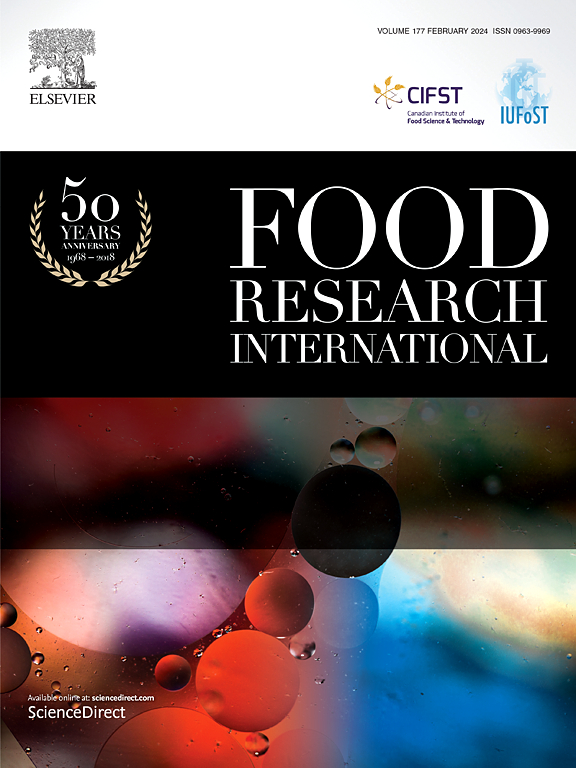Dietary vitamin C improves muscle hardness and springiness associated with collagen and elastin synthesis in grass carp (Ctenopharyngodon idella)
IF 7
1区 农林科学
Q1 FOOD SCIENCE & TECHNOLOGY
引用次数: 0
Abstract
This study explored the effects of dietary vitamin C on growth performance, flesh quality, and collagen and elastin content in adult grass carp (Ctenopharyngodon idella). A total of 540 fish (initial weight 585.00 ± 0.96 g) were randomly distributed into six groups, with three replicates per group and 30 fish per replicate. Fish were fed six experimental diets containing 4.01, 44.13, 83.47, 124.17, and 167.18 mg/kg L-ascorbyl-2-polyphosphate (C2PP), as well as 82.82 mg/kg ethylcellulose-coated ascorbic acid (EC-AA), for 9 weeks. The results indicated that C2PP supplementation (44.13–167.18 mg/kg) enhanced adult grass carp growth performance. It also increased muscle hardness, chewiness, and springiness, as well as crude protein and crude lipid content, while decreasing cooking loss and moisture content. Vitamin C supplementation increased collagen and elastin synthesis in adult grass carp through the activation of the transforming growth factor-beta (TGF-β)/mothers against decapentaplegic homolog (Smads), phosphatidylinositol-4,5-bisphosphate 3-kinase (PI3K)/protein kinase B (AKT)/target of rapamycin (TOR), La ribonucleoprotein domain family member 6 (LARP6), and Fibulin-5 signaling pathways. Concurrently, vitamin C could inhibit collagen and elastin degradation by upregulating tissue inhibitor of metalloproteinases (TIMPs). Based on percent weight gain (PWG), hardness, and chewiness, the dietary vitamin C requirements for adult grass carp were 107.05, 104.42, and 97.00 mg/kg, respectively. These results indicate that vitamin C can improve the flesh quality of grass carp by promoting collagen and elastin deposition.

饲料中维生素C提高草鱼肌肉硬度和弹性,与胶原蛋白和弹性蛋白合成有关
本试验旨在探讨饲料中添加维生素C对成年草鱼生长性能、肉质及胶原蛋白和弹性蛋白含量的影响。试验选取初始体重为585.00±0.96 g的540尾鱼,随机分为6组,每组3个重复,每个重复30尾鱼。分别饲喂6种试验饲料,分别含有4.01、44.13、83.47、124.17和167.18 mg/kg l-抗坏血酸-2-聚磷酸(C2PP)和82.82 mg/kg乙基纤维素包被抗坏血酸(EC-AA),试验期9周。结果表明,添加C2PP (44.13 ~ 167.18 mg/kg)可提高草鱼成鱼的生长性能。它还增加了肌肉的硬度、嚼劲和弹性,以及粗蛋白质和粗脂肪含量,同时降低了蒸煮损失和水分含量。补充维生素C通过激活转化生长因子-β (TGF-β)/母细胞对抗十五瘫痪同源物(Smads)、磷脂酰肌醇-4,5-二磷酸3激酶(PI3K)/蛋白激酶B (AKT)/雷帕霉素靶蛋白(TOR)、La核蛋白结构域家族成员6 (LARP6)和纤维蛋白-5信号通路,增加了成年草鱼胶原和弹性蛋白的合成。同时,维生素C可以通过上调组织金属蛋白酶抑制剂(TIMPs)抑制胶原蛋白和弹性蛋白的降解。根据增重率、硬度和嚼合力,草鱼对饲料维生素C的需取量分别为107.05、104.42和97.00 mg/kg。由此可见,维生素C可通过促进胶原蛋白和弹性蛋白的沉积来改善草鱼的肉品质。
本文章由计算机程序翻译,如有差异,请以英文原文为准。
求助全文
约1分钟内获得全文
求助全文
来源期刊

Food Research International
工程技术-食品科技
CiteScore
12.50
自引率
7.40%
发文量
1183
审稿时长
79 days
期刊介绍:
Food Research International serves as a rapid dissemination platform for significant and impactful research in food science, technology, engineering, and nutrition. The journal focuses on publishing novel, high-quality, and high-impact review papers, original research papers, and letters to the editors across various disciplines in the science and technology of food. Additionally, it follows a policy of publishing special issues on topical and emergent subjects in food research or related areas. Selected, peer-reviewed papers from scientific meetings, workshops, and conferences on the science, technology, and engineering of foods are also featured in special issues.
 求助内容:
求助内容: 应助结果提醒方式:
应助结果提醒方式:


